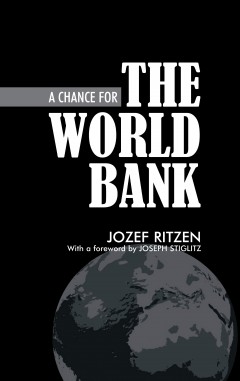A Chance for the World Bank
By Jozef Ritzen
Foreword by Joseph Stiglitz
Other Formats Available:
- About This Book
- Reviews
- Author Information
- Series
- Table of Contents
- Links
- Podcasts
About This Book
This book is an authoritative and radical manifesto for changes that are urgently required in development cooperation. The book predicts that, unless radical steps are taken by the World Bank, the first decade of the century will witness a ever-widening gulf between poor and rich countries.
Jo Ritzen presents a picture of a world at a crossroads. One road leads to substantial ('radical') reform in the rich countries, in combination with a substantial push towards better governance in developing countries. The other leads to further increases in inequality between rich and poor countries. 'Millennium development goals' – such as achieving universal primary education by 2015 or reducing child mortality by two-thirds in 2015 – have had widespread support. They will not be reached if the world follows this road; unfortunately, the signs suggest that it has already started to do so.
'A Chance for the World Bank' provides an overview of the challenges faced by the World Bank, and explores how it has organized itself to accomplish its mission. This book proposes that the World Bank still has a chance to achieve its stated goals; in order to do so, it needs to take a number of radical steps: to create a level playing field in trade for the developing countries; to harmonize aid and save developing countries from the gigantic transaction costs of aid; and to promote governance in developing countries and to reduce rigorously induced corruption by multinationals.
Reviews
'A persuasive agenda for development reform, written with authority and insight.' —Paul Collier, Professor of Economics, University of Oxford
'A very rich analysis of the political economy of development and the changing role of the World Bank in further enhancing the growth and poverty reduction of the Third World. A refreshing and original vision, this book deserves to be carefully read and digested'. —Erik Thorbecke, HE Babcock Professor of Economics, Cornell University
'The book will be useful for all those interested in contemporary policy making on development assistance… food for further thought about some of the great political and moral issues of today.' —Wil Hout, Institute of Social Studies, The Netherlands
Author Information
Jozef Ritzen is President of the Universiteit Maastricht. Previously he was Vice President of the World Bank's Development Economics Department (2001–3) and was the Minister of Education, Culture and Science for The Netherlands (1989–98).
Series
Table of Contents
List of Illustrations and Maps; List of Tables; Acknowledgements; Foreword by Joseph Stiglitz; Abbreviations; 1. Introduction: Off on the Wrong Foot; Part I: Why Development Assistance: Setting the Stage; 2. Poverty Remains a Concern; 3. Globalization Does Not Automatically Lead to Convergence; Part II: The World Bank: A Close Encounter: 4. Shifts in Development Paradigms; 5. Decision-Making at the World Bank; 6. The Different Faces of the World Bank; 7. Partners in Development Assistance; 8. Civil Society and Development; 9. Successes and Failures; 10. A Chance for the World Bank; Notes
Links
Stay Updated
Information
Latest Tweets



